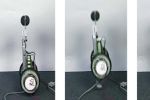Are You Going to Eat That?
Ever hear of the endowment effect? In its simplest terms, this refers to the added worth that humans give to things that they own. Studies have shown, for example, that people will sell a product they own for a much higher price than they'd be willing to pay for it when buying from someone else. Can you relate? It sounds like fairly predictable human behavior. But to what extremes can this endowment effect influence our eating habits? This is where it gets interesting.
Lauren Block, a marketing professor at Baruch College in New York City, is co-authoring a study to be published in the June issue of the Journal of Consumer Research. In this study, she and her team questioned 165 students about their yogurt preferences. The students were given yogurt smoothies that were past their "best if enjoyed by" date, although they were still considered safe to eat. The students were split into two groups. The "endowed" group of students, were told the yogurt was theirs to keep.
The results of these findings showed that 38% of those in the endowed group were willing to drink the smoothie either right then or later. But only 13 percent of the students who didn't own the yogurt were willing to drink the smoothies. Those who were told to keep their smoothie were also less likely to think it would make them sick.
"Our results help explain why a person might consume expired food that they found in the fridge, but not consume expired food found in a friend's fridge," Block said. This endowment effect theory suggests that people will rationalize their behavior towards expired foods when they “own” the food.
Let’s personalize this a little. If you were in a grocery store, would you buy yogurt that you knowingly understood to be a few days past the expiry date? Probably not. But, if you looked in your fridge for that yogurt and found it was just a few days past the expiry date, you’d probably still eat it, right? This research suggests that you would (feel free to defend your own position in the comments below). Researchers chalk this up to the fact that people unconsciously give more value to things that they own, and will rationalize accordingly.
So, what’s the big deal? It’s part of the human psyche to personalize things. If we name something, we own it. If we buy it, we own it. But like it or not, possessions influence behavior. The problems start when that influence becomes negative, or irrational. This latest study raises new concerns for the health and safety of consumers who ignore expiry dates. Yogurt is one thing, but meat products are another.
Some food have inherent safety guards in place, like foods that grow moldy. If a food’s appearance or smell repels us, we probably won’t eat it (regardless of whether or not we own it). But if we follow this endowment effect theory all the way through, what about other products with expiry dates? According to Block, “Many consumers do not know that sunscreen, condoms, fire extinguishers and medicine lose efficacy over time… Our research suggests that consumers may underestimate the risk associated with using products past their expiration dates, and for some products, this might have a negative consequence."
Via: USnews.com
5 Comments
Popular Tags
SciTech
Regular Features

Featured
SciTech
Science Confirms the Obvious 2008
The findings may be no-brainers (yes, you do get sick in winter), but these studies uncover hidden truths in conventional wisdomBuilding the Real Iron Man
While audiences flood theaters this month to see the comic-book-inspired Iron Man, a real-life mad genius toils in a secret mountain lab to make the mechanical superhuman more than just a fantasy with the XOS Exoskeleton
Popular on Popsci
Most Viewed
SciTech
- Largest Snake on Earth Uncovered
- Thar She Blows!
- Is Pot a Performance Enhancer?
- Threat Watch, LHC?
- Eyewitness Testimony Takes a Few More Hits
- Are You Going to Eat That?
- An Apple By Any Other Name
- As Seen On TV: Can Science Keep Pests at Bay?
- Reasons to Flee the Modern World
- Kidney Donation: Less Painful than Childbirth
Most Commented
SciTech
- Are You Going to Eat That?
- High Speed Rail Link to Make Canberra Sydney’s Second Airport
- Bigger Balls - PopSci Investigates Tennis
- Cheap Supplements Relieve Migraines
- An Apple By Any Other Name
- Stay Healthy or Go Blind!
- We Are What Our Parents Ate
- Eyewitness Testimony Takes a Few More Hits
- Birth Order Can Affect Relationship Compatibility
- Fast Ferry to Manly Begins
Most Emailed
SciTech
- Limbs, Prosthetics, and Tusks, Oh My!
- High Speed Rail Link to Make Canberra Sydney’s Second Airport
- Birth Order Can Affect Relationship Compatibility
- Delay (Anew) for the LHC Restart
- Weighing the Costs
- Stay Healthy or Go Blind!
- Bigger Balls - PopSci Investigates Tennis
- Fast Ferry to Manly Begins
- Not Such an Easy Pill to Swallow
- A False Scare Raises a Real Specter of Exploding Batteries









Comments
I'm probably anti-endowment all the way! When it comes to food, I have a habit of throwing out anything that is past its use by date. When it comes to other personal possessions, I simply go by market value when trying to sell them. Of course when buying things, I go for the best bargain, but then again who doesn't try to save when buying things?
0 out of 1 people found this comment helpfulYou can see the logic of the endowment effect when buying and selling items. But with the economy like it is these days, everyone is trying to make their dollar stretch more and get the most value out of any sale they make. As for the food item, heck as long as it isn't rancid and plagued with colonies of strange fungus or bacteria I'll eat it!
1 out of 1 people found this comment helpfulHope you take a sniff of it before you eat it, cause things like cheese which look good actually smell foul (not the normal cheesy smell mind you). Basically I would never risk it with anything dairy or meat, cause I remember there were a number of food poisoning cases a ouple of years back where restaurants were serving undercooked meat which had expired. They probably thought their meat was still good despite evidence to the contrary :p
0 out of 0 people found this comment helpfulI can relate to that. The other day I bought two bags of chips from the supermarket on sale for half price.
When I got home, I discovered that the expiration date was about 3 days later. Had I noticed beforehand the expiration date was so close, I may not have bought them, but since I already owned them, fair game wouldn't you agree?
But there are limits. Dairy and meat I won't eat past it's 'best by' date (unless it's chocolate) but sweets, chips and other things that just get chewy I'll still eat hahaha
0 out of 0 people found this comment helpfulI think if you sell it for the right price, most people would ignore the finer details...like it may poison you if you eat it 3 days later!
But then I say if any good food item appears to be a massive bargain, its because it will expire soon and in the supermarket's view, if they manage to sell it for anything that is a profit they make.
0 out of 0 people found this comment helpful